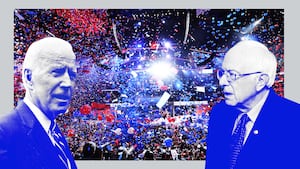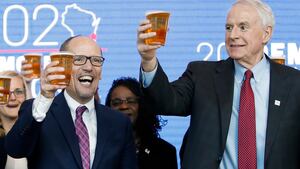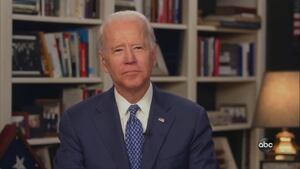The Democratic National Convention’s decision to move its marquee event from July to August was intended to help mitigate public health concerns around COVID-19.
But several DNC members told The Daily Beast that the advance notice they received from officials at the national headquarters about the new calendar date ranged from essentially non-existent to just a few hours before the information was pushed out publicly. One DNC member learned about the scheduling change by reading about it in the news. Another received a call from a party official just as stories started to surface online. A third got more lag time: “a couple hours in advance” of the official statement.
The DNC said the organization notified congressional leadership, campaigns, DNC members, state party chairs, and other Democratic stakeholders the day of the announcement and before the story broke. “We spoke to hundreds of people that day and since, and have received positive feedback,” Communications Director Xochitl Hinojosa said in a statement.
But behind closed doors, the apparent communication breakdown over logistics has created a tense and confusing situation for some party officials who said they felt increasingly isolated from the broader convention conversation.
“The phone call that I got was at the same time that the story broke,” Andrew Werthmann, a DNC member from Eau Claire, Wisconsin, told The Daily Beast when asked about timing. “It was very short notice.”
Werthmann said he had been pushing for the date to be postponed for several weeks. Evaluating the chaotic situation on the ground in his home state of Wisconsin, where the Tuesday primary has become a controversial battle amid health concerns, he asked party officials about the prospect of moving the convention back a bit.
“I actually already—well over a month ago—had said that it seemed likely that we were going to have to move it, and DNC leadership said there’s no plans to do that,” he said. “Some of these decisions are not run through the membership. That’s part of the issue.”
The new timeline comes as former Vice President Joe Biden, the presumptive Democratic nominee, suggested that another previously off-the-table possibility, a virtual convention, should perhaps now be on the table. In an interview on ABC’s This Week on Sunday, Biden said Democrats should be “thinking about” the idea of holding the event digitally. Asked by anchor George Stephanopoulos if he is willing to consider that having a physical convention in August might not be feasible, Biden said he was.
“Yes. Well, we'll have to do a convention, may have to do a virtual convention,” he said. “We should be thinking about that right now. The idea of holding a convention is going to be necessary but we may not be able to put 10,000, 20,000, 30,000 people in one place and that's very possible.”
The decision to postpone the convention from July 13 to Aug. 17 was announced after Biden publicly called for the event to be pushed back. In an interview on March 31, Biden said “it‘s hard to envision” the convention happening in July. Previously, the DNC said it would not change the date.
By April 2, the convention was penciled in for the following month. “I’m confident our convention planning team and our partners will find a way to deliver a convention in Milwaukee this summer that places our Democratic nominee on the path to victory in November,” Joe Solmonese, the CEO of the convention, said in a statement, adding that the committee believes the “smartest approach is to take additional time to monitor how this situation unfolds.”
National party officials had emphasized the need to monitor the public health situation as the pandemic heightened over the past several weeks. But as health advisories change frequently around the novel virus, local party officials said they aren’t always looped in about new plans in the works, adding an additional layer of uncertainty to an already unpredictable time.
One DNC member said flatly “it’s kind of normal” to be left out of the conversation, including regarding something as consequential as a new convention date, a large-scale event that typically takes upwards of a year to plan. Another member admitted to finding out about the decision to move from July to August simply by reading the news that day.
Barry Goodman, a member of the DNC’s rules and bylaws committee, downplayed the significance of the short notice, saying he got a call from a party official “a couple hours in advance from when it was publicized,” earlier than other members. Goodman, who has hosted fundraisers for Biden, said the possibility that the convention wouldn’t happen wasn’t entertained during his conversation.
Still, as of late March, several DNC members expressed frustration about what prospective contingency plans were in the works if further changes were necessary, with multiple Democratic sources telling The Daily Beast there hadn’t been a call to address the rapidly changing situation for weeks. One DNC member said at the time the messaging they received about convention-related updates was no different than what appeared in public press releases.
Werthmann sees parallels to what’s happening with the calendar tweak now. “I suspect there had been planning for weeks to look at this, but DNC members weren’t a part of that decision,” he said. “There’s no memo that goes out to say we’re looking at options.”
The convention planning comes as the party moves to strategize around the November general election against President Trump. On Monday, the DNC announced $22 million in YouTube ads across 14 battleground states. The same day, Trump, ostensibly in the midst of addressing the pandemic, was also preoccupied with the opposing party’s convention and likely nominee, alleging in a tweet that Biden called for a virtual convention so he didn’t have to show up.
To that, Biden responded: “Mr. President, I hope we can gather in Milwaukee, but that is going to depend on you stepping up and doing what needs to be done to handle this pandemic. I have laid out how you can do that,” linking to his plan.
“Happy to discuss anytime.” Biden replied, and did so hours later, Trump told reporters on Monday night.









